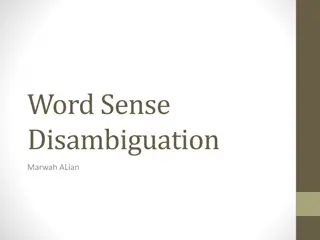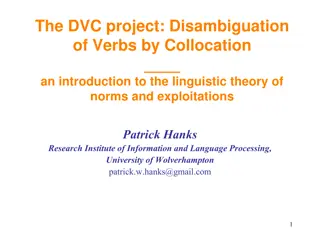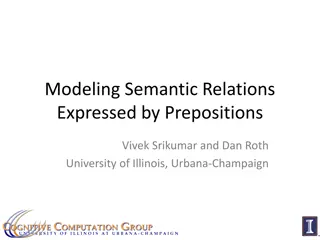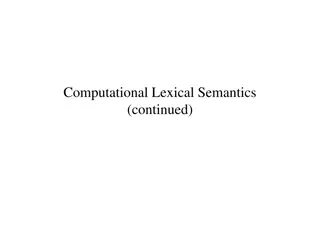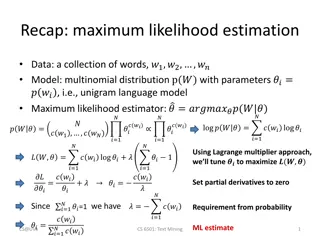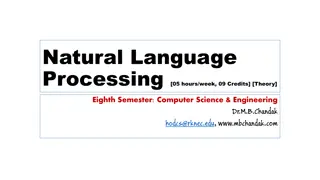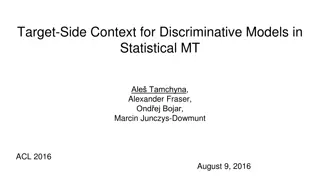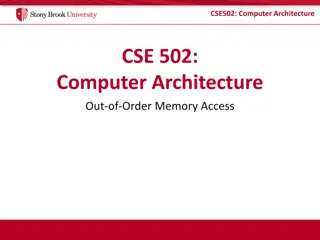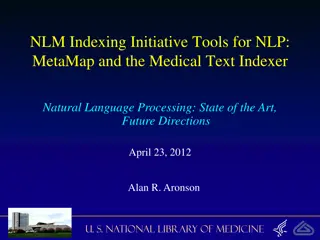Understanding Word Sense Disambiguation: Challenges and Approaches
Word Sense Disambiguation (WSD) is a complex task in artificial intelligence that aims to determine the correct sense of a word in context. It involves classifying a word into predefined classes based on its meaning in a specific context. WSD requires not only linguistic knowledge but also knowledge
2 views • 12 slides
Understanding Verb Disambiguation through Collocation Patterns
Verbs in natural language are highly ambiguous, posing challenges for word sense disambiguation projects. This article introduces the role of phraseological norms and exploitations in distinguishing between different senses of verbs by analyzing collocation patterns. Through Corpus Pattern Analysis,
0 views • 5 slides
Automated Knowledge Base Construction: Taxonomy Induction and Entity Disambiguation Overview
Explore the foundations of automated knowledge base construction through taxonomy induction and entity disambiguation frameworks. Learn about organizing and distinguishing entity types, the significance of structuring entities like physicists, villages, and chemical formulas. Delve into the inputs,
0 views • 53 slides
Understanding Collocations in NLP
Collocations, a key concept in Natural Language Processing (NLP), involve understanding the meaning of words based on the company they keep. This content delves into the properties, types, and examples of collocations, emphasizing their importance for NLP applications. It discusses how collocations
0 views • 20 slides
Semantic Relations Expressed by Prepositions in Modeling Study
Explore the study on modeling semantic relations expressed by prepositions conducted by Vivek Srikumar and Dan Roth from the University of Illinois, Urbana-Champaign. The research delves into prepositions triggering relations, ontology of preposition relations, examples of preposition relations, pre
0 views • 25 slides
Exploring the Role of RCauth in EUDAT's Authentication Process
Delve into EUDAT's utilization of RCauth in authentication, examining policies, compliance, and traceability requirements. Discover the interplay between RCauth, B2ACCESS, and IOTA/DOGWOOD, shedding light on credential disambiguation and traceability concerns.
0 views • 24 slides
Understanding Word Sense Disambiguation in Computational Lexical Semantics
Word Sense Disambiguation (WSD) is a crucial task in Computational Lexical Semantics, aiming to determine the correct sense of a word in context from a fixed inventory of potential word senses. This process involves various techniques such as supervised machine learning, unsupervised methods, thesau
0 views • 67 slides
Understanding Word Sense Disambiguation in Computational Lexical Semantics
Explore the intricate world of word sense disambiguation in computational lexical semantics, covering supervised and unsupervised techniques, lexical sample and all-words tasks, and various approaches such as knowledge-based and machine learning. Delve into the complexities of interpreting different
0 views • 94 slides
Statistical Text Analysis Techniques Overview
The content covers key concepts in statistical text analysis, including maximum likelihood estimation, N-gram language model smoothing, and perplexity calculation. It then delves into Latent Semantic Analysis and the practical application of vector space models, highlighting considerations like syno
0 views • 28 slides
Comprehensive Course on Natural Language Processing
This eighth-semester course in Computer Science & Engineering covers the fundamentals of Natural Language Processing (NLP) including basics, modeling techniques, syntactic and semantic parsing, information extraction, and machine translation. Prerequisites include knowledge of English grammar, theor
1 views • 16 slides
Microsoft Academic Services: Behind the Scene - Architecture and Knowledge Enhancement
Microsoft Academic Services provide a comprehensive view into the architecture and processes involved in enhancing knowledge publication data. From information extraction to conflation, disambiguation, and knowledge refinement to learning, the MAKES framework utilizes advanced techniques to improve
0 views • 6 slides
Importance of Context in Statistical Machine Translation
Understanding the significance of context in machine translation is crucial for improving accuracy and disambiguating word sense. This research delves into the impact of target-side context for discriminative models in statistical machine translation, showcasing how context influences model performa
0 views • 29 slides
Understanding Computer Architecture Concepts in CSE502
Exploring advanced topics in computer architecture like out-of-order execution, dynamic scheduling, memory disambiguation, load/store queues, and more. Delve into the intricacies of executing memory instructions, handling memory disambiguation problems, and optimizing performance through techniques
0 views • 23 slides
MetaMap and Medical Text Indexer for NLP: Advancements in Biomedical Concept Identification
Cutting-edge tools like MetaMap and the Medical Text Indexer (MTI) are revolutionizing natural language processing in the field of medicine. These tools provide advanced linguistic analysis, word sense disambiguation, and efficient indexing of medical texts. MetaMap excels in named-entity recognitio
0 views • 27 slides
